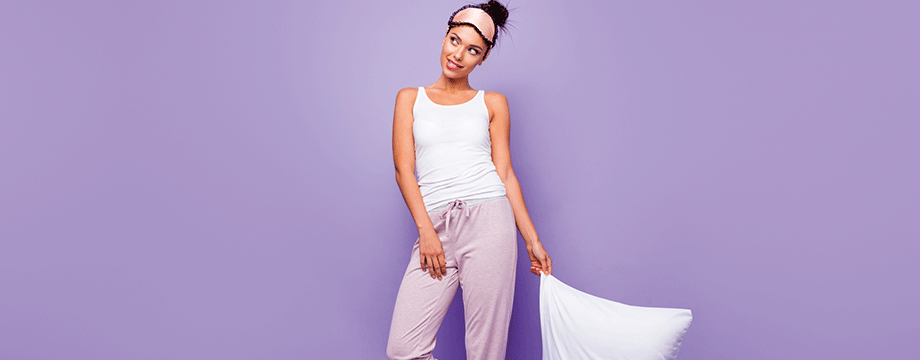Natural sleep solutions

Top tips for how to enjoy a better night’s sleep
It’s been a stressful few months for us all recently as the Covid-19 pandemic has turned our lives upside down. According to a survey carried out by King’s College London, 38 per cent of respondents experienced sleep issues during the recent lockdown. If you have been struggling to get some shut-eye, read on to find out how you could tackle the problem naturally.
Soothe your stresses
“There are a few different reasons why someone might struggle to sleep,” says Natasha Richardson, a medical herbalist and founder of Forage Botanicals (www.foragebotanicals.co.uk). “The two most common are problems falling asleep and problems staying asleep. Often when we struggle to get to sleep we have poor sleep hygiene. A weird term I know, but it refers to a sleep routine whereby screens are off, lights are low, and extraneous stimulus is at a minimum. Another reason we can struggle to fall asleep is that we are still buzzing from the anxieties, stresses and adrenaline from the day. For this you would probably benefit from relaxants. These are herbs which help us relax. Some examples are chamomile, passion flower or lavender. They are usually featured in sleepy time teas available from most supermarkets. I recommend having a cup (using two tea bags to increase the strength) an hour before bed as part of your bedtime routine.
Try some adaptogens
“If you are struggling to stay asleep it’s likely that you’ve been struggling with stress for a longer time,” says Natasha Richardson. “So, when your body is going through the lighter part of a sleep cycle it wakes you up completely instead! This is the harder of the two problems to deal with usually and should be combated with adaptogens. These are herbs which help us recover from long-term stress, PTSD and increase stamina too. Some examples are liquorice, rhodiola and ashwagandha. I’d recommend finding these as supplements from a whole food shop as they are roots which are quite difficult to prepare as teas. Another set of herbs which can help are nervines; these are herbs which protect the nerves, as though you’re wrapped in bubble wrap. My personal favourite is oat tops but hawthorn is an alternative. They both make lovely teas but are harder to come by. Try your local wholefood shop to see what they have.” Note: Liquorice should not be used in hypertension and pregnancy.
Source some supplements
“There are a few key nutrients we need for sleep which often get missed off in our day-to-day diets,” says registered nutritional therapist Michaella Mazzoni (www.michaellamazzoninutrition.com). “When our body is creating sleep hormones like GABA and melatonin, there is a chain reaction that takes place which relies on co-factors to actually create the hormones needed for sleep. These include magnesium, B6 and zinc. Without these nutrients, it is harder for our body to do its job right. Also, including the ‘ingredients’ for these sleep hormones can be a big help. 5-HTP turns into melatonin and theanine turns into GABA. You can supplement individually or opt for a blend/complex that contains all of these nutrients. If you are on medication, please check with a health practitioner before starting supplements.”
Keep cool
During the summer months the hot weather can make it difficult to get a good night’s sleep. “Adopt Mediterranean practices by keeping curtains and blinds drawn during the day but keep windows open to allow cool air in,” says Suzy Reading, a chartered psychologist and sleep expert with Tempur (uk.tempur.com). “Use light-coloured curtains as metallic blinds and dark curtains can make the room hotter. Open windows at night to allow air to circulate and create a through-draught together by opening windows and doors in different rooms and wedge doors open. A fan is a useful solution to cool your environment in warmer weather and is more affordable than air conditioning. Try turning a fan on for 30 minutes before going to bed to cool your bedroom before sleep. There are several ultra-quiet models available today, although some find the humming noise soothing to drift off to sleep to!”
Take some CBD
“CBD contains a non-psychoactive, chemical compound, cannabidiol, which is renowned for its calming, anti-anxiety and sleep-inducing properties,” explains nutritionist Alix Woods. “The compound interacts with the regulatory centre of the body, including the brain, hormones and nerve receptors. These interactions are anti-inflammatory, encourage relaxation and improve sleep. If you’re a late-night worrier, CBD oil could be just the thing. CBD has been found to reduce the stress response as it interacts with serotonin, the ‘happy hormone’ receptors and GABA, the anti-inhibitory receptors in the brain. This enhances serotonin and in combination with GABA, calms the mind, minimises worry and promotes relaxation.”
Prepare for sleep
“Make changes to your bedroom to make it more conducive to sleep,” advises leading London nutritionist Lily Soutter (www.lilysoutternutrition.com). “Darken the room as much as possible and keep it quiet and cool. Make sure your bed and pillows are comfortable for you. Perhaps the most important change that can be made to a bedroom is to keep activity out of the bed that shouldn’t be there. Don’t check emails on your phone or computer in bed. Watch television and read books in another room. Help your body prepare for sleep by making the room and bed a place where you only sleep. Blocking blue light before bed can transform sleep. Blue light from laptops, phones, iPads and TVs can trick our brain into thinking that it’s daytime. This can disrupt the brain’s natural sleep-wake cycle leading to a poor night’s sleep.”
Read previous Your Health articles here...
Read articles from our latest issue here...